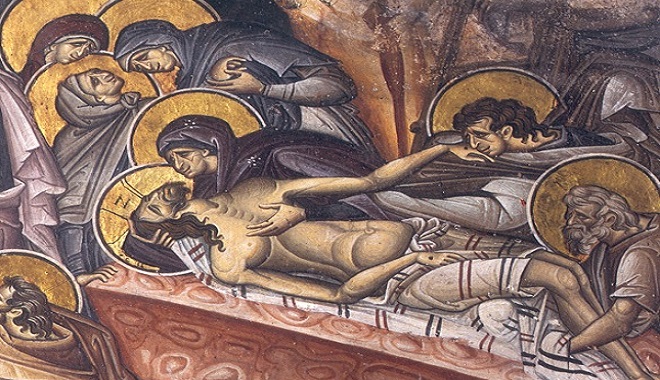Freedom’s Hideaway
18 May 2022On the evening of Great Friday, we begin the service with a rather strange tropario. It’s a hymn which is joyful rather than mournful. Not a lament, but a hymn of praise: ‘God is the Lord and has appeared to us…’. The one and only true God. And we glorify him as Lord of heaven and earth.
But the tropario doesn’t sit well with Christ’s burial. Because, at that time, Christ chose to hide. He chose to hide, not only his divine nature- his Godhead- but also his human nature. And what was his hideaway of choice? A tomb. And he allowed himself to be completely covered on the night of his death.
***

Why this concealment, Lord? Why this challenge to our reason? Seeing you now, ‘dead, naked and unburied’, who can praise you as ‘the true God and Lord of Glory’. Who can believe that he, who we’re now preparing to bury, is one of the Trinity, the only-begotten Son of God the Father, the Lord and Ruler of the world?
And yet, the Church keeps its eyes open. And it asks us to see that, both on the cross and in the tomb, Christ never for a moment ceased to be seated on the throne of God and was always consubstantial with the Father.
This is why we’ve altered the inscription written on the cross by those who crucified him. They wrote: ‘Jesus the Nazarene, the King of the Jews’. We’ve corrected it and write: ‘The King of Glory’. Because Christ’s tomb is the most light-filled place on earth. It’s a source of divine light. ‘Truly more lovely than paradise’. Why? Because that’s where Christ hid; for us. In order to free us from decay.
***
Obeying his Father’s will unto death, Christ was humiliated, mocked, tortured and killed. And although he could have made a spectacular demonstration of his divine power, he deliberately hid this power. In a tomb.
As the outstanding modern theologian, the late George Florovsky points out however, this deliberate concealment on Christ’s part leads to some tragic revelations:
* It uncovers the hatred and blindness of people.
* It reveals the stupidity of human wickedness.
*It reveals the iciness of our hearts.
* And, above all, it reveals the great lie of our so-called freedom. It shows how benighted those people are who, having written God out of their lives, are supposedly ‘autonomous’ and allegedly ‘free’.
Christ comes to us today to grant us the supreme and perfect freedom: freedom from the bonds of death. Who doesn’t long for such freedom? Who doesn’t feel fear and trembling in the face of death? Who doesn’t understand that it’s no use making a show of bravado in the face of death?
***
Christ alone was able to view death ‘from on high’. But in obedience to his Father and for our sakes, he descended in order to ‘take on’ death. To wrestle with it. He experienced all the agony of death in its greatest horror. He sweated blood. And, as a human being, he quailed.
But, although he had the freedom to say ‘No’ to his Father, in the end he dispelled the myth of human ‘freedom’. He submitted completely to the will of God the Father. He willingly agreed to die for us. And in this way, he defeated death for us: ‘having trampled down death by death’.
He thus showed us that the only people who are truly free are those who can say to God: ‘May your will be done’. This is the supreme human freedom. This is the only exercise of human freedom. And this alone conquers death.






